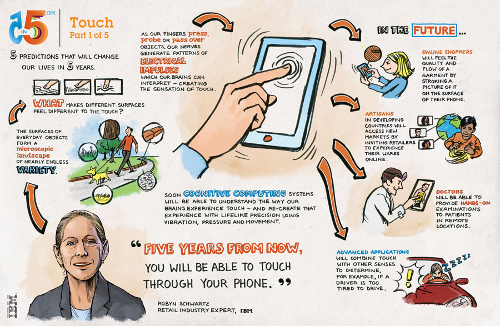Computers will have the ability to mimic human senses in five years according to IBM. But not only is this more guesswork than informed forecast, but the way in which each sense will be incorporated varies hugely.
The suggestion comes in IBM’s annual “5 in 5” report in which the company’s analysts come up with five ideas for how the tech world will look in five years. This year the company has chosen to theme the predictions around the idea of senses as part of what it calls the “era of cognitive computing.” The idea is that this is the next logical step in computers “thinking” more like humans, following the triumph of IBM’s supercomputer Watson in defeating two Jeopardy! champions.
The specific forecasts are:
You will be able to touch a smartphone screen that uses a combination of infrared sensors and vibration to simulate physical sensations from the pictured object. IBM gives the idea of an online shopper “touching” Egyptian cotton sheets, which shows they have much cleaner minds than the rest of us.
Computers will do better at sight by being able to mimic the human ability to recognize the big picture rather than just intricate details. At the moment this is the field of facial recognition, but IBM points to computers one day being able to spot diseased tissue in an MRI.
Developers will produce more applications using a computer’s ability to precisely detect sound. This could mean anything from spotting frequency changes in a bridge before it visibly buckles to analyzing a baby’s cry.
Computers will be able to learn an individual’s specific taste preferences and be able to come up with diet plans that deliver the right nutritional mix while still pleasing a person with intolerances and allergies or simply a fussy eater such as a child.
Sensors will be able to detect and analyze specific smells, meaning a computer could spot problems with a sanitation system or even detect possible hygiene breaches in an operating theater. Though realistically it’ll probably mean a bad breath detector in your smartphone and a bunch of “denied it/supplied it” apps.
What IBM doesn’t mention is that computers already have a sixth sense: how else would they know exactly the most annoying time to freeze, crash or generally mess you about?
The annual predictions have been running long enough that we can now see how they bore out and it’s something of a mixed bad. Here’s IBM’s predictions from 2008 for the world of 2013:

